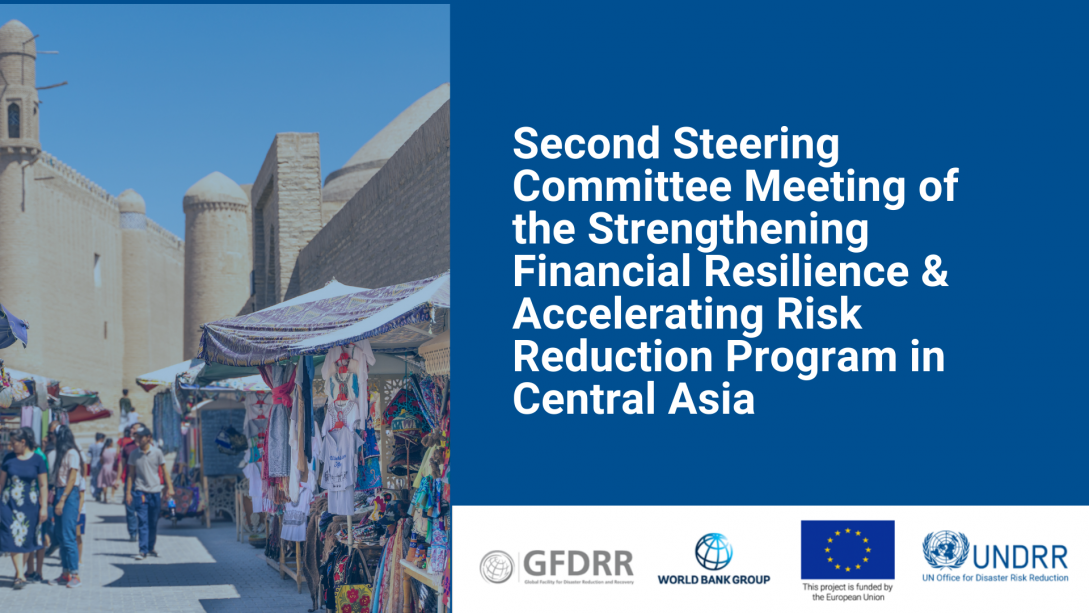The Second Steering Committee Meeting of the European Union - funded Strengthening Financial Resilience & Accelerating Risk Reduction Program in Central Asia provides updates on risk reduction actions in the region

The SFRARR has two result areas, which are implemented in close collaboration with the Center for Emergency Situations and Disaster Risk Reduction (CESDRR). The first result area is managed and implemented by the United Nations Office for Disaster Risk Reduction (UNDRR), and the second is managed by the Global Facility for Disaster Reduction and Recovery (GFDRR) and implemented by the World Bank. While UNDRR provides guidance on strengthening governance systems in disaster risk reduction, disaster data collection mechanisms and monitoring progress in the achievement of the goals set in the Sendai Framework 2015-2030, the GFDRR and the World Bank lead the work on risk identification and financial resilience.
In his opening remarks, Johannes Stenbaek Madsen, Head of Cooperation at the Delegation of the European Union to the Republic of Kazakhstan, underlined the participation and valuable collaboration of representatives of partner countries in disaster risk activities in Central Asian region and thanked involved partners for the achievements in 2021.
In the past year, UNDRR and its partners achieved progress in strengthening governance and regional coordination in disaster risk reduction, as well as in risk knowledge advocacy. This included the establishment of the national disaster risk reduction (DRR) platform in Turkmenistan in August 2021, and all five target countries reporting their national progress through the Sendai Framework Monitor for 2020 and 2021. UNDRR also worked with the CIMA Foundation and ADPC to train experts to use the DesInventar-Sendai disaster loss data accounting system in local contexts. Through its Making Cities Resilient 2030 initiative (MCR2030), UNDRR worked with local governments to strengthen disaster resilience at local level. This included supporting the cities of Ashgabat, Bishkek, Dushanbe, and Nur-Sultan to complete two out of four stages of their resilience assessments. The final goal is to develop recommendations for their local DRR strategies.
At the regional level, the key outcomes of UNDRR’s work were the development of the first regional DRR strategy, the Strategy for the development of cooperation between Central Asian countries in DRR for 2022-2030 and the Action Plan for its implementation in 2022-2023. Furthermore, high-level delegations from Kazakhstan, Kyrgyzstan, Tajikistan, and CESDRR actively participated in the 2021 European Forum for Disaster Risk Reduction, which took place from 21 - 24 November 2021 in Matosinhos, Portugal. UNDRR also expanded its advocacy and outreach work in the region in 2021. For example, the International Day for DRR was celebrated in all five countries with youth and children taking part in various activities.
In 2022, the UNDRR plans to continue providing technical support to countries on the DesInventar Sendai system, and to strengthen or establish national DRR platforms. UNDRR will continue working with cities to build their resilience through MCR2030, and to provide support and actively engage the CESDRR, including in capacity-building and knowledge exchange activities. UNDRR will collaborate with CESDRR to organize the next Regional Forum of Heads of National Disaster Management Agencies in 2022 in Dushanbe, Tajikistan. The delegations from Central Asia will also participate in the Global Platform for Disaster Risk Reduction, which takes place from 23 - 28 May 2022 in Bali, Indonesia.
“Despite COVID-19, the UNDRR’s regional collaboration has further evolved and expanded. We could see the commitment from all countries in the region to the Sendai Framework 2015-2030 through active participation in all our activities, especially during the EFDRR that took place last November. We look forward to working together this year to deliver the planned outcomes of the Initiative. We would like to thank our partners and our donors for all their support,” – said Octavian Bivol, Chief of the UNDRR Regional Office for Europe and Central Asia.
One of the main achievements of the World Bank and GFDRR during 2021 was the organization of a series of five country-based workshops on exposure mapping in Kazakhstan, Kyrgyzstan, Tajikistan, Uzbekistan, and Turkmenistan. These events helped to build important capacities of local experts, institutions, and research groups that have a role in exposure mapping and the development and use of disaster risk information and its components.
Another achieved milestone under this result area was the delivery of regionally consistent probabilistic disaster risk assessments for earthquake, fluvial and pluvial flood, and landslide hazards. The project team has furthermore commenced constructive dialogue on disaster risk financing solutions and carried out diagnostics of preparedness and disaster response capabilities of social protection systems in three Central Asia countries.
The World Bank and GFDRR ensured continuous visibility of the Program, preparing relevant communications materials for each event, such as press releases, social media posts, and visuals. These efforts include a feature story, published on the World Bank website, dedicated to the International Day for Disaster Risk Reduction. The story celebrates Central Asian professionals who work in DRR sphere.
In 2022, the World Bank and GFDRR will finalize the regional multi-hazard risk assessment and conduct institutional and operational assessments of national social protection delivery systems to address future natural hazards or other shocks. The project team will also launch the country-level analytical work and capacity building activities to develop tailored disaster risk financing solutions.
“A regional approach to disaster risk management and financing can have significant benefits and is crucial for achieving our common objectives of helping the people of Central Asia in their efforts to build a more resilient and sustainable future for themselves” – said Cristina Otano, Senior Operations Officer, GFDRR
For additional information please contact:
Ms. Elnura Abakanova, Communications Officer, EU Delegation to Kazakhstan, elnura.abakanova@eeas.europa.eu
Mr. Abdurahim Muhidov, UNDRR Regional Programme Coordinator: muhidov@un.org
Ms. Chyi-Yun Huang, World Bank Senior Urban Development and Disaster Risk Management Specialist, chuang@worldbank.org
